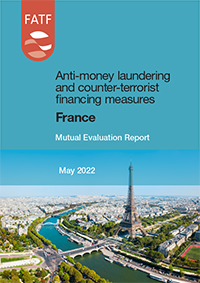Technical Compliance
Ratings which reflect the extent to which a country has implemented the technical requirements of the FATF Recommendations.
C = compliant | LC = largely compliant | PC = partially compliant | NC = non-compliant

Paris, 17 May 2022 - France has a robust and sophisticated framework to fight money laundering and terrorist financing that is effective in many respects, notably in law enforcement, confiscation areas and international cooperation but needs to do more in areas such as the supervision of professionals involved in the activities of legal persons and the real estate sector.
France faces a substantial range of money laundering threats that include tax fraud and drug trafficking. The country also faces a high-level threat of terrorism and terrorist financing since the 2015 terrorist attacks. But France has successfully identified and understood these risks, and adapted its legal framework to mitigate them, including through thematic national policies.
The understanding of money laundering and terrorist financing risks by the financial sector and their supervisors is generally good, supervision of the virtual asset sector is also under development. However, risk-based supervision of designated non-financial businesses and professions is insufficient in some areas, in particular real estate agents and notaries that are involved in a real estate sector. The non-financial compliance with its anti-money laundering (AML) and counter terrorist financing (CFT) obligations has generally improved but remains limited for real estate agents and business service providers. Some sectors are not sufficiently aware of their obligations, especially in relation to beneficial ownership, politically exposed persons and suspicious transactions reporting.
France is achieving particularly good results in the use of financial intelligence, money laundering investigations and prosecutions, with competent authorities prioritising the prosecution of high-end money laundering cases. However, despite an increase in staff, a lack of specialised investigative resources impacts the duration of investigations, especially in complex money laundering cases.
France has made it a policy priority to confiscate criminal assets and has been obtaining very good results, with criminals being deprived of proceeds, property or other assets of a value equivalent to EUR 4.7 billion every year.
French authorities also have a well-established practice of international cooperation with their foreign counterparts, including by providing good quality and effective mutual legal assistance in criminal matters and making extensive use of informal cooperation.
France has made the fight against terrorism and its financing one of its top priorities and has obtained very good results. Prosecution, investigative and intelligence authorities collaborate effectively and in a structured manner, including for the purpose of exchanging information. Terrorism investigations systematically include a terrorist financing component. The legal and operational framework, as well as the staffing in place, enable French authorities to fight effectively and in a coordinated manner against the risk of terrorism and its financing, resulting in a 93% conviction rate for terrorist financing prosecutions.
France plays an active role in proposing terrorist financing individuals or entities designations to the European Union, United Nations and national sanctions lists. Recent reforms allow targeted financial sanctions to be implemented without delay. France needs to follow-up on this reform to ensure its proper implementation. France is depriving terrorists, terrorist organisations and terrorist financiers of assets related to terrorist financing activities to a large extent and in line with its overall TF risk profile. However, France needs to improve the monitoring of the non-profit sector to prevent its potential misuse for terrorist financing, including through a more in-depth terrorist financing risk assessment through this sector.
The FATF adopted this report at its March 2022 Plenary meeting.